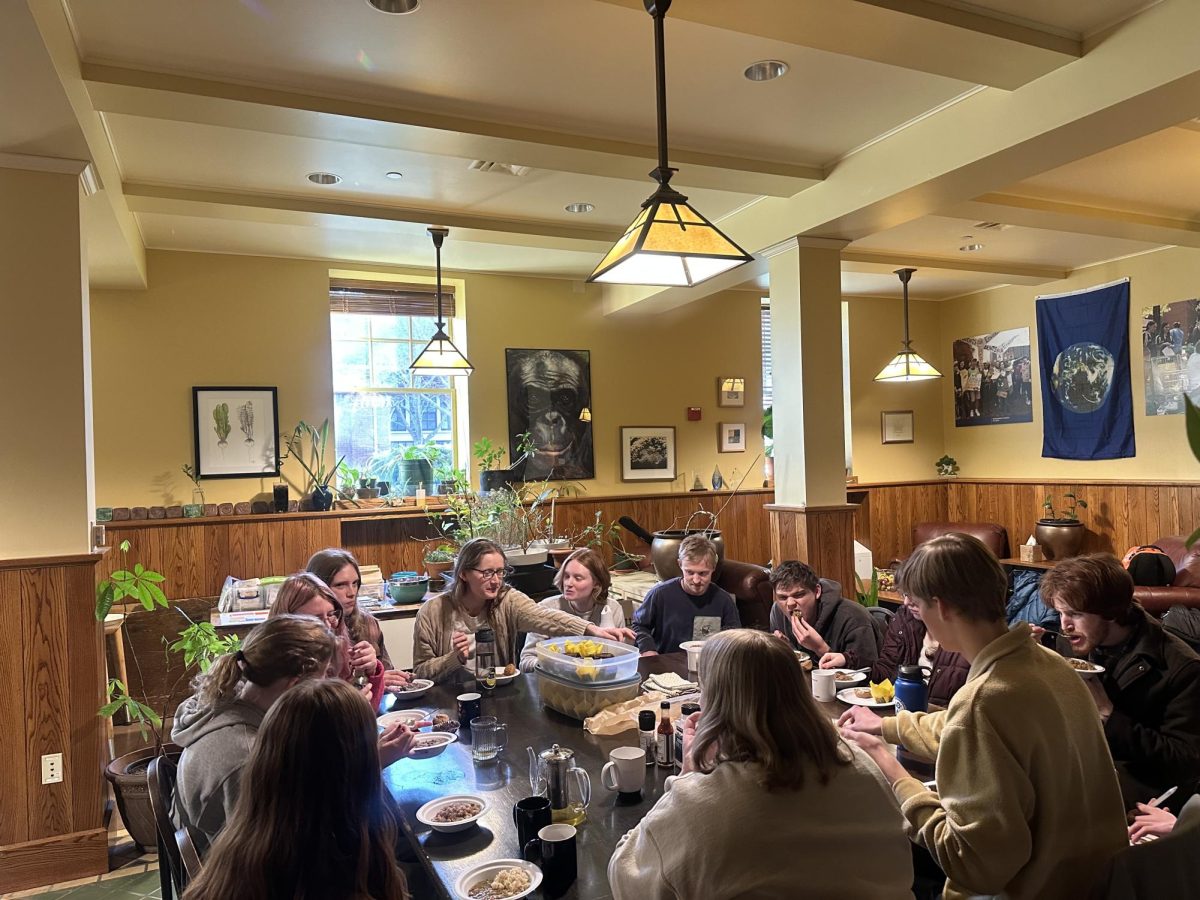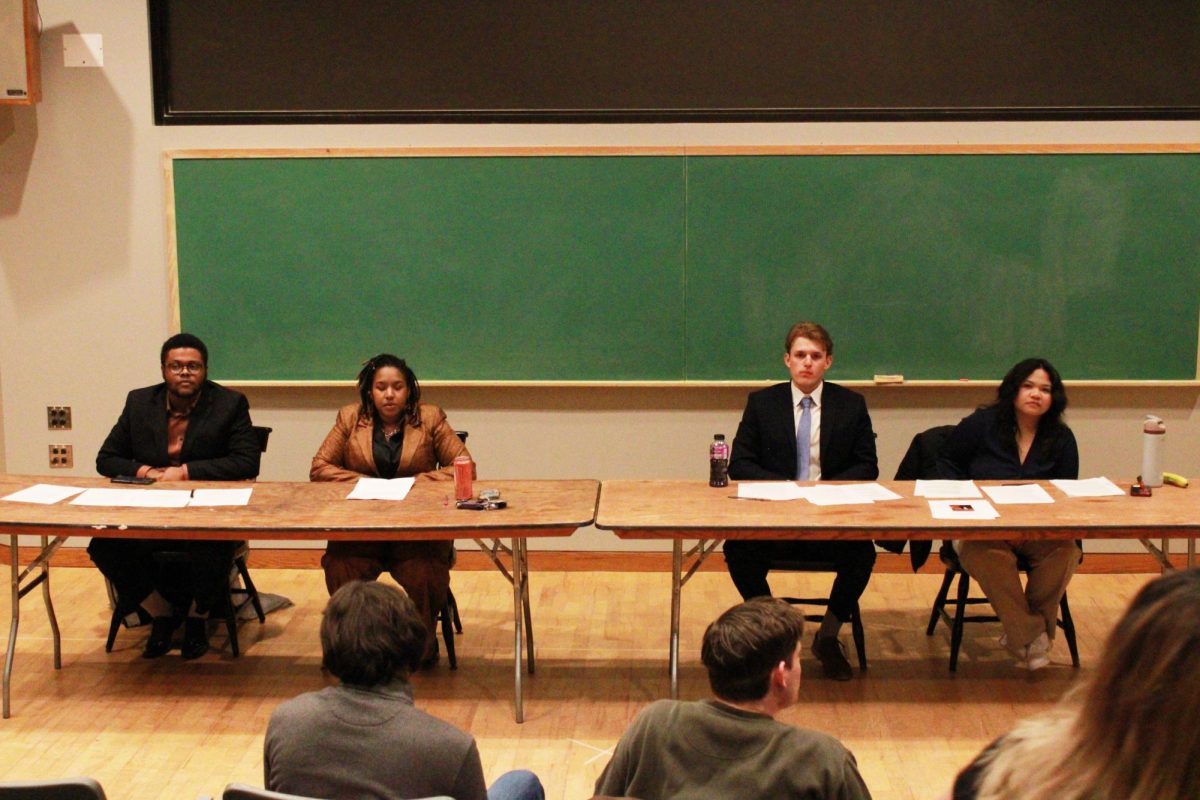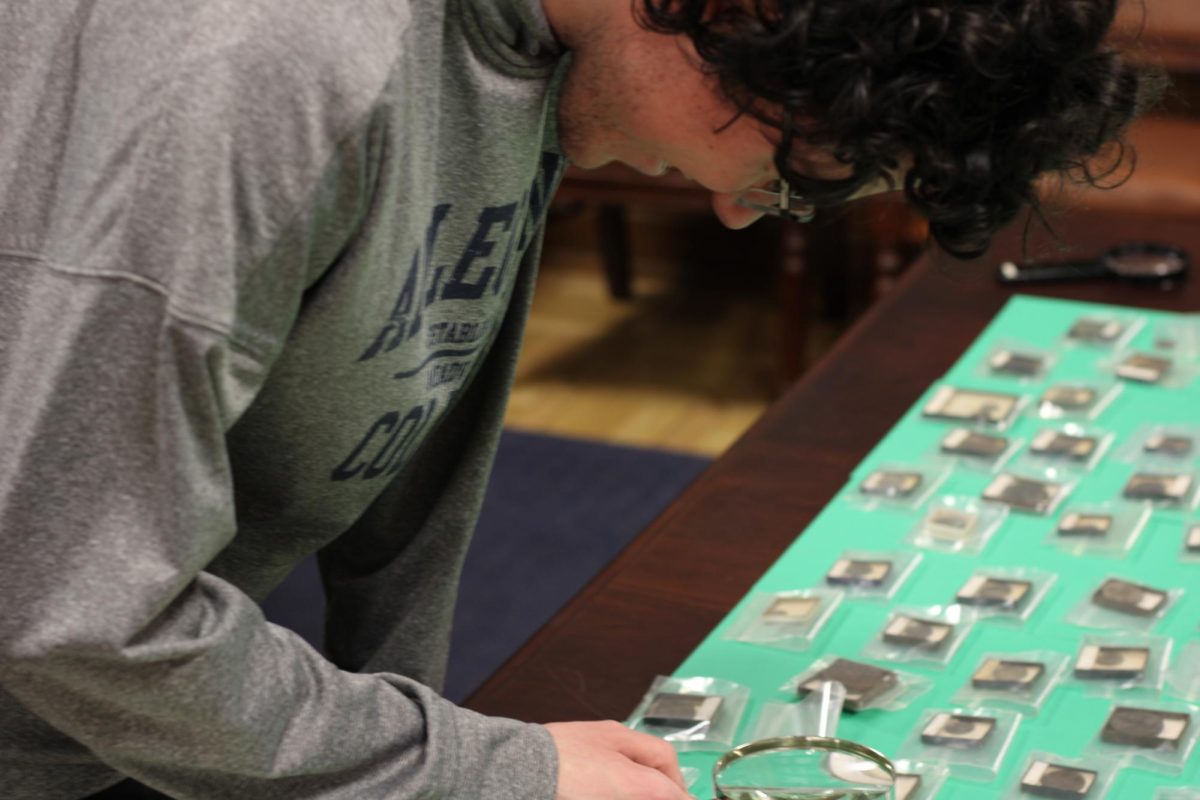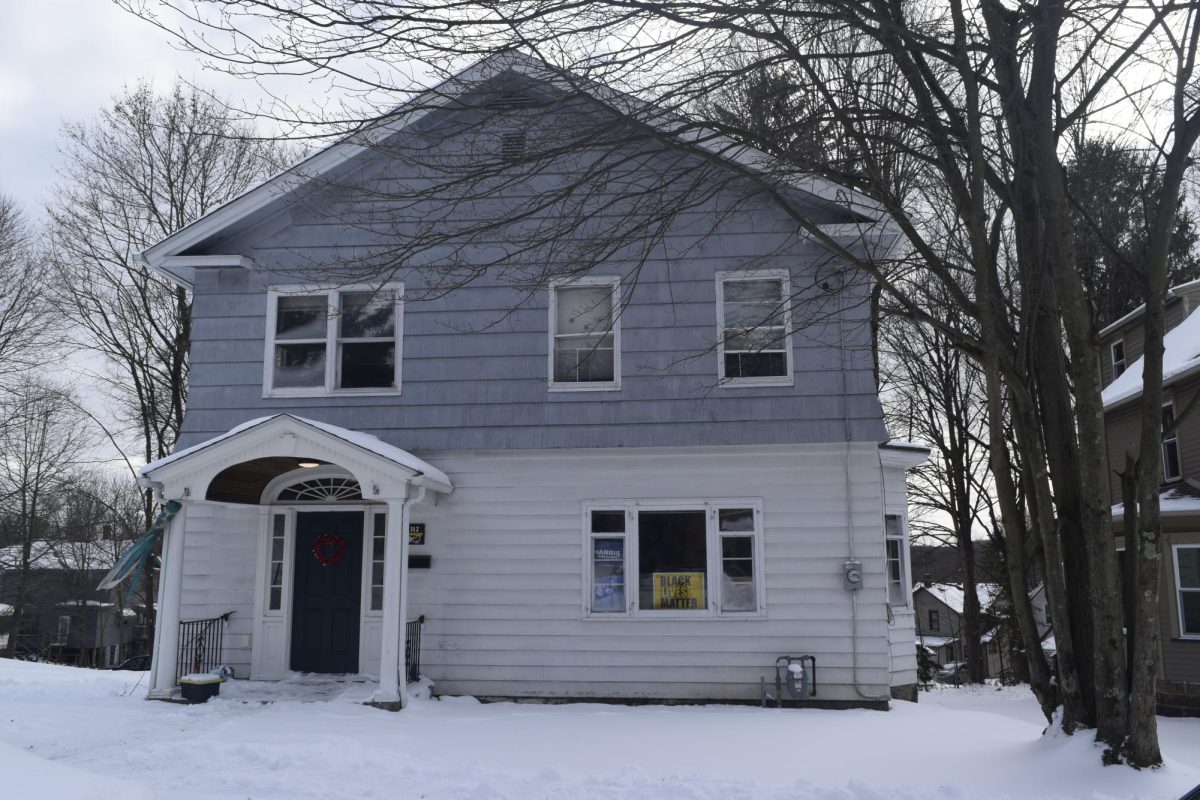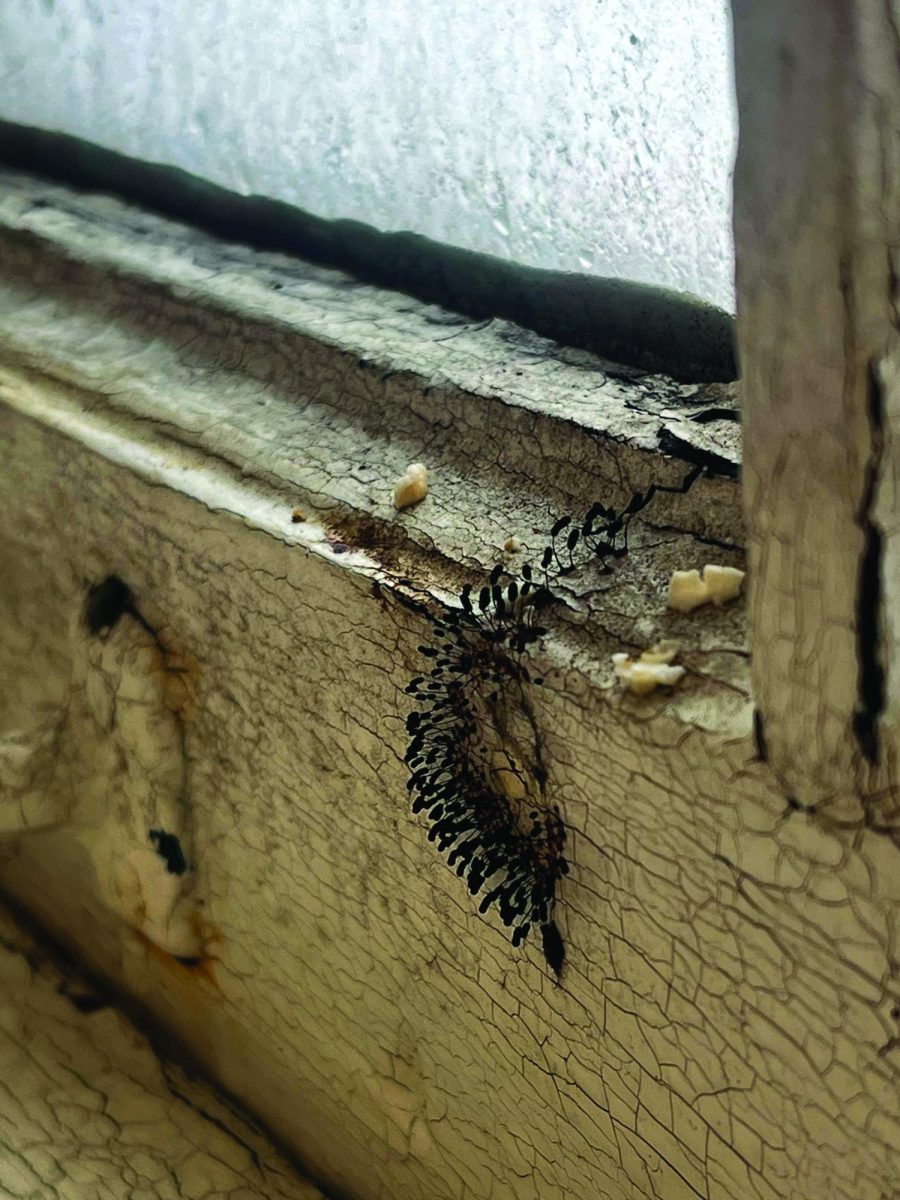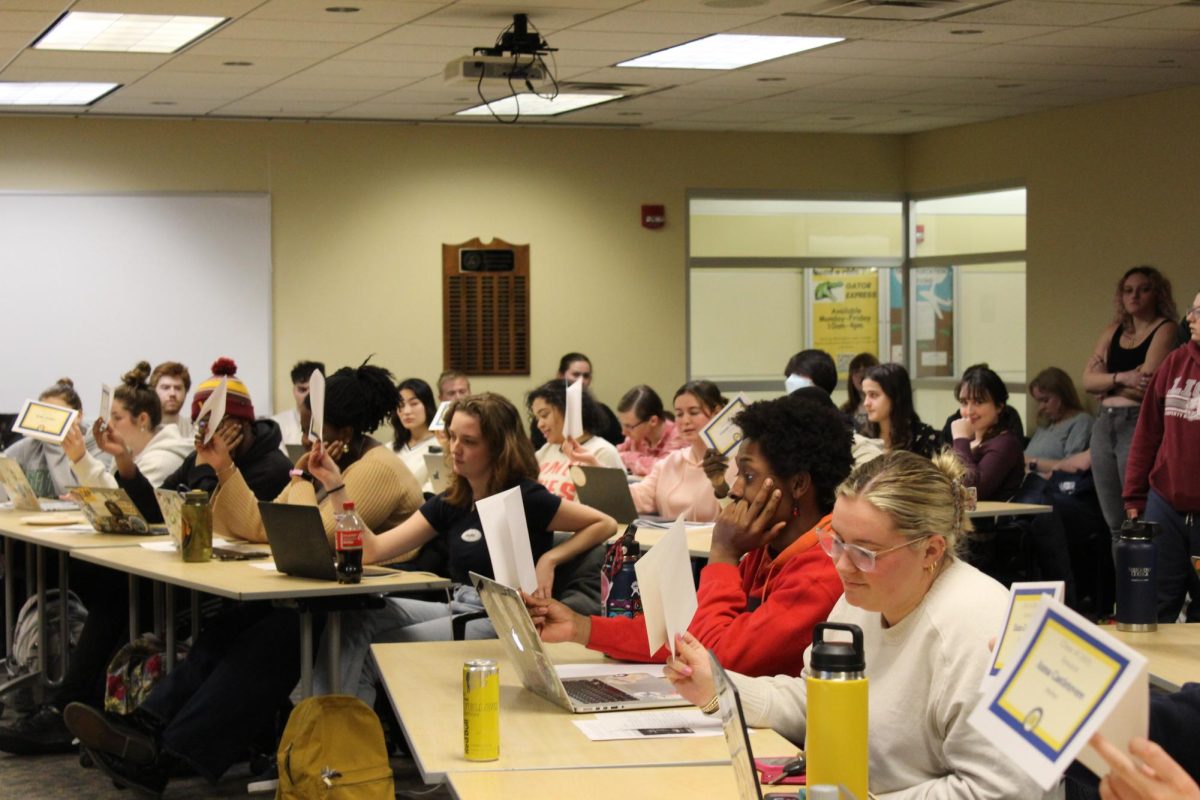Allegheny Student Government heard constituent concern over major changes to the ASG constitution recommended by the attorney general at its General Assembly on Tuesday, Feb. 13. ASG also announced preliminary details for this year’s presidential election cycle.
During his cabinet report, Attorney General Will Lowthert, ’24, laid out a number of recommendations for changes to the ASG constitution, ranging from updating cabinet expectations to major shifts, including shrinking ASG, having the organization adjudicate its own constitutional infractions and selecting its own advisor each year.
“Mainly what I just changed was implementing practices ASG is already doing into the Constitution — more procedural things, like expectations for cabinet,” Lowthert said during his report. “Technically, there is no expectations for cabinet, so we just added the same specifications that are expected for the Senate. And then more broadly, making the Constitution reflect what the new Allegheny College student body is, i.e. possibly moving Senate down from 20 members to 16 members and then also shrinking cabinet too.”
Among Lowthert’s recommended changes are the merging of six cabinet positions into three by adding the Environmental Affairs and Sustainability portfolio to Student Affairs, the Organizational Development position to Chief of Staff, and the Parliamentarian position to the Attorney General’s office.
Constituent Comments
The recommendations have already drawn criticism; during constituent comments at the end of the meeting, former ASG Director of Environmental Affairs and Sustainability Bianca Sanchez, ’24, asked Lowthert to explain why some roles would be eliminated.
In reply, Lowthert said that ASG has struggled to reach full capacity for years, and pointed out that the college’s student population has shrunk by almost 1,000 since the constitution last saw major revisions in 2008.
“Senate has not been filled this whole entire semester, academic year,” Lowthert said. “It wasn’t filled the whole entire last academic year. I believe the academic year before that was also not filled either.”
Lowthert also pointed out that these recruitment and retention struggles are also visible in the cabinet, which has had at least one empty seat since the start of the academic year. It took until Halloween for ASG to fill the second of two co-directorships of Student Affairs — at the same meeting where Hunter Goerman, ’25, resigned as director of the treasury. Since then, the treasury position has remained empty and was split in two at the end of last semester by constitutional amendment.
When Sanchez resigned from her position as director of Environmental Affairs and Sustainability in December, she cited a heavy workload as a senior in an email to The Campus at the time.
Given the vacancies, Lowthert said that it’s better to have someone working a cabinet job in part rather than not at all.
“For example, no one’s doing any Environmental Affairs right now, but if we combine — and maybe that will be in the future, maybe it’s not, it’s up to Senate to decide — but by combining it with Student Affairs, it ensures that someone will be doing that task,” Lowthert said.
However, Sanchez pointed out that such a move would run contrary to what ASG did just three months ago, noting that one of the justifications for splitting the treasurer position in two was because of the heavy workload.
“Now we’re deciding to put more work onto a few cabinet members, given the fact that, yes, some of these roles may not have as much work even when they are filled,” Sanchez said. “But the roles that they are being added to have enough work to begin with — and let alone students do not have enough time to be even doing more work as it is.”
This last line received applause from Co-Directors of Student Affairs London Dejarnette, ’24, and Iris Styers, ’26.
Sanchez also said that it was “a little against the values of this college” to adjust the cabinet, adding that even if sustainability was still valued within Student Affairs, a student would not have the opportunity to focus only on environmental concerns.
“They would have to take the Student Affairs position entirely — which is again a big position and they have two very different focuses of what their roles are,” Sanchez said, receiving another round of applause.
Another constituent, Julia Sonen, ’24, said she had considered taking the sustainability position for two years but did not apply because of her own busy schedule.
“I know that it’s something that right now is a relatively small commitment, which is the only reason I would have been able to consider applying,” Sonen told ASG. “I think it’s very important that a school like Allegheny, that values sustainability so much, has sustainability positions within everything.”
Cabinet Behavioral Standards
Sanchez also asked a question about the new behavioral standards for cabinet members — in particular, a line that prevents cabinet members from discussing “unofficial reports, results, and/or legislation not yet brought forth through the general assembly.”
“It feels a little bit exclusive for people not to be able to share news until after the fact,” Sanchez said. “Sometimes things only go through one round of voting. If a constituent doesn’t know what’s happening in advance and doesn’t have the opportunity to come in and speak on that, and that gets voted upon, and then after the fact, they hear about it and didn’t get the opportunity to voice their opinion, what then?”
Lowthert attempted to reply but was cut off by Vice President Sam Ault, ’26, who told Lowthert he did not have the floor. Ault then opened the floor up for additional constituent comment. Sanchez’s question was not answered during the meeting.
The provision Sanchez pointed out is not entirely new; it is already in place for senators in their behavioral conduct. In an interview Wednesday, Lowthert said that the rule was designed to prevent anyone other than a senator from writing ASG legislation.
“They can think about the amendment with constituents, talk about the amendment with constituents in the lead up to it, but as soon as they begin writing it, the only people who can help write it are senators,” Lowthert said. “And they can’t share that writing with constituents until it’s introduced in ASG.”
Lowthert pointed to the finance amendment passed at the end of last semester, which he said was guided by constituent comment before and after the writing process.
After the meeting, Sanchez said that she was only aware of the constitutional recommendations because she still receives copies of the meeting minutes every Tuesday, despite resigning from ASG more than three months ago.
“I have asked ASG to remove me from the weekly mailing list numerous times now,” Sanchez wrote in an email Tuesday evening. “They just haven’t removed me from the list.”
Additional changes
Lowthert has recommended a number of additional changes to the constitution, some of which could have significant effects for the way ASG operates.
One major change would be to place the selection of the ASG adviser in the hands of ASG itself.
Under the recommended changes, the ASG president and vice president would appoint an adviser at the start of every academic year; the adviser would then serve a one-year term — including the summer — before a new adviser is appointed. The adviser would also need to be approved by a majority of senators. Under ASG’s present constitution, there are no stipulations for who ASG’s adviser should be, though the position has traditionally been held by the dean of students. Currently, Dean for Student Life Trae Yeckley advises ASG.
Speaking on Wednesday in an interview, Lowthert said that the suggestion was based on the constitutions of student governments at other colleges and universities, and would allow ASG to select other administrators or faculty members as an adviser.
“I think Trae has done a fantastic job as our advisor and I have zero concerns about them,” Lowthert said. “In the end, it’s just a way to ensure that future ASGs and Senates have the ability to actually tailor their advising to best suit their sort of government style.”
Lowthert has recommended that if a cabinet seat is empty, “the president and vice president, in consultation with Senate can assign current members of ASG with their consent, this includes both Cabinet and Senate members, the tasks of this unfilled position.”
Further changes are recommended to the process of removing ASG members from office, including explicitly stating that ASG senators can be removed for violating the Allegheny Statement of Community or for “verbally stating or portraying actions that are discriminatory or harmful to the bodies they are representing.”
The recommended changes would also rework the Judicial Review Board, which reviews all cases of constitutional infractions and the impeachment process.
The proposed recommendations would change the current process, instead making the JRB consist of the Rules Committee — which itself is made up of the attorney general and a senator from each class — the chief of staff and one of the two directors of Student Affairs. The ASG adviser would also sit on the JRB as a non-voting member.
Lowthert said that the changes were necessary because, despite recruiting “aggressively,” he had seen no student interest in JRB.
“There is just not students really wanting to fill those positions — or students that have time to fill those positions,” Lowthert said.
Under the current constitution, the JRB cannot be filled by members of ASG — a way to shield the organization from perceived or actual bias, then-ASG Vice President Rudra Schultz-Ray, ’23, said during JRB proceedings last spring.
“If we were in charge (of) investigating ourselves and punishing ourselves, I doubt that anything would actually come from it, and it’s a way of mostly protecting how we are viewed as an institution and among the student body,” Schultz-Ray said at the time.
Lowthert acknowledged that the recommendation “does have its drawbacks.”
“That is why, if Senate does take this up, I would highly recommend they debate it and figure out if how we have JRB currently is the best solution, if the recommendation I make is a better solution or if there’s another, even more innovative solution out there,” Lowthert said.
And at the end of the day, Lowthert said that his suggestions were just that — intended to start a conversation.
“Some of them were very, um — we’ll say unique recommendations that I thought, ‘This could work’ or ‘This could not work’ and that is, like, a great thing about debate in politics and ASG is, it is open up to people to actually share all their opinions for the best constitution,” Lowthert said. “These were not meant to be end-all be-all recommendations, and I think there might have been a slight misconception about that at last GA.”
A full list of the recommendations — which have not been formally proposed or put up for a vote — are now available in the minutes of the GA on Engage.
Electoral Cycle
During her report, Parliamentarian Ankitha Pamula, ’24, announced that students can now file to run for the ASG presidency
“You will need a 50-signature petition, a document stating your reasons for running and short biographies for each ticket number and ticket photos for each,” Pamula said. “We’re also tabling Thursday and Friday during lunch hours to raise awareness with the general student body — anyone is essentially open to run.”
Once candidates file, they will have just under a month to campaign. If, like last year, there are more than two tickets declared, primary elections will be held via Google Form from Thursday, March 14, until Sunday, March 17. The two highest-placing tickets will advance to a presidential debate on Tuesday, March 19, in Quigley Auditorium.
Voting for the General Election will open Saturday, March 24, and run until Tuesday, March 27, with the victors announced by 9 p.m. on Wednesday, March 28. Cabinet applications for the 2024-25 are slated to open Monday, April 1.
ASG will next meet at 7:30 p.m. on Tuesday, Feb. 20, in room 301/302 of the Henderson Campus Center.





